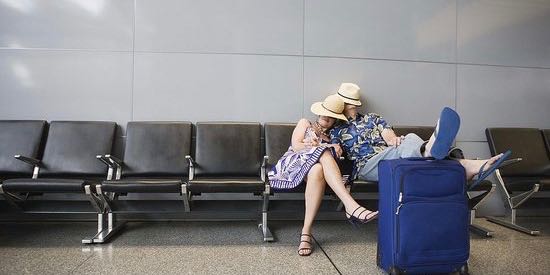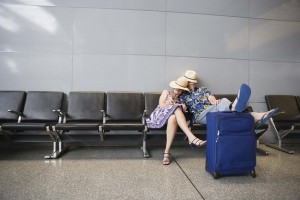Most everyone has experienced the effects of jet lag. Some people suffer from jet lag much more than others. For example, my pilot husband rarely felt jet lag on his flights. Other travelers who cross several time zones may feel irritable, confused, sleepy during the day; have insomnia at night; plus experience poor concentration, lack of appetite or hunger at inappropriate times, and the general blahs
Your body’s internal clock cannot fail to notice the leap in time zones. What a plane flight can accomplish in a matter of hours, your circadian rhythms can take several days to catch up with. During that time, you’re likely to experience disruption to your sleeping and waking cycle, known as jet lag.
Here are some tricks you can add to your travel toolkit to minimize the effects of jet lag:
Start preparing early
About four days before your flight, start gradually shifting your sleeping and eating times to coincide with those times at your destination. Upon boarding the plane, change your watch to reflect your destination’s time zone. Once you arrive, immediately adopt the local time for your daily routine. This is VERY important.
Sleep on the plane
This works especially well if you’re traveling overnight or flying west to east. Being in a pressurized cabin is extremely tiring, and the more rest your body gets on the way, the better you’ll be able to deal with jet lag. If you’re taking a very long flight — United States to Asia or Australia, for example — opt for a window seat and bring pillows or other padding to prop yourself up against the cabin wall. Bring earplugs and a sleep mask to help dampen noise and block out unwanted light.
Catch a redeye flight
This way, you’ll eat your preflight dinner at a normal time and be much more likely to sleep during the flight. Depending on the length of the flight and the number of time zones you cross, you’ll arrive at your destination in the morning or afternoon. This is the best way to replicate your normal schedule at your destination, making it easier to reset your internal clock.
Be careful with sleeping pills
I have a friend who can’t fly without medication. While a sleeping pill with a short cycle may be helpful on overnight flights, make sure that you time the dosage correctly or you may be groggy when you land — not ideal. Consider taking a half dose if necessary. Also, don’t try out a pill for the first time on the plane. Take only medications you already are familiar with.
Hydrate
Try to drink at least 8 ounces (1 cup) of water for every hour you’re in the air, even if you don’t feel thirsty. If you wear contact lenses, clean them thoroughly before your flight, use eye drops during the flight, and consider removing your lenses if you nap. Pack some moisturizing lotion, lip balm, and a hydrating spray with essential oils like lavender to spritz your face with occasionally. (Remember to ensure that all toiletries are packed in TSA-compliant containers of three ounces or less.)
Avoid coffee
For 12 hours before and for the duration of your flight, avoid caffeine and overeating. Both can make you wake up more frequently (once you do fall asleep) and result in less restful sleep.
Cabin air is terribly dry and dehydrating, and altitude can increase the alcoholic effect. Generally, one drink in the air is equivalent to two or three on the ground. That cocktail might relax you, but it’s likely also to further dry you out and worsen the symptoms of jet lag.
Consider melatonin
Melatonin is a nonprescription hormone that helps you set your internal clock. Many scientists advocate melatonin supplements to alleviate jet lag. Studies suggest that taking 3 milligrams of fast-release melatonin prior to bedtime for several days after arrival in a new time zone can ease the transition.
Get sunlight
On arrival at your destination, spend plenty of time out in the sunlight. It is a powerful stimulant which will naturally help your body reset its time clock to coincide with the new time zone.
Stay up until bedtime
Unless you arrive at your destination at night, when you’re reasonably close to a normal bedtime, don’t fall asleep as soon as you get to the hotel. If you’re absolutely exhausted from travel and cannot keep your eyes open, take a 15-minute power nap: any longer and you might find yourself wide awake at 4 a.m. Avoid heavy exercise close to bedtime, although some light exercise earlier in the day is beneficial.












